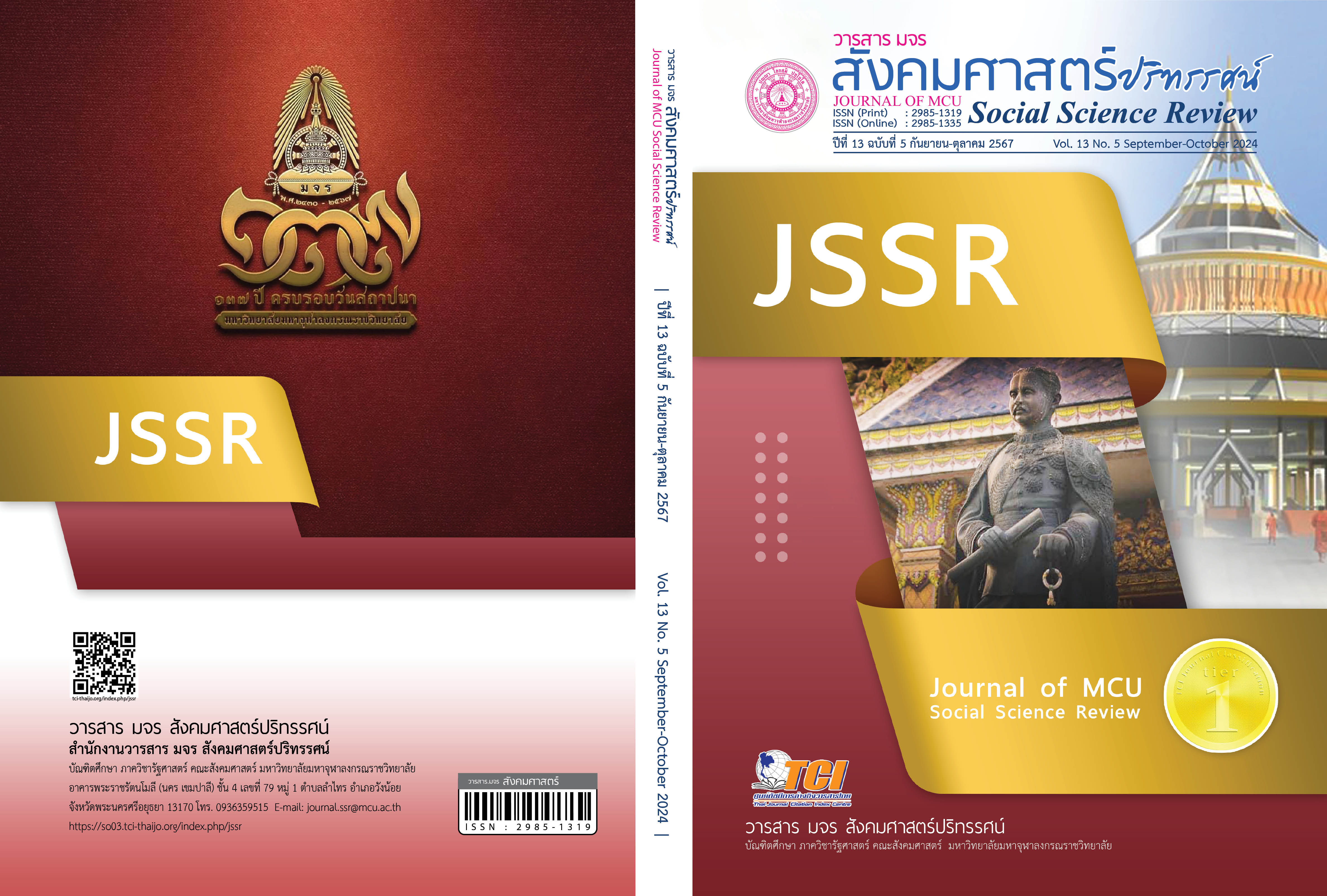รูปแบบการพัฒนาโรงเรียนทั้งระบบเพื่อขับเคลื่อนการเปลี่ยนแปลง สู่การจัดการเรียนรู้ตามแนวทางฐานสมรรถนะ
คำสำคัญ:
การพัฒนาโรงเรียนทั้งระบบ, การขับเคลื่อนการเปลี่ยนแปลง, การจัดการเรียนรู้ ตามแนวทางฐานสมรรถนะบทคัดย่อ
บทความวิจัยนี้มีวัตถุประสงค์ 1. ศึกษาสภาพการดำเนินการและปัจจัยที่เกี่ยวข้องในการพัฒนาโรงเรียนทั้งระบบเพื่อขับเคลื่อนการเปลี่ยนแปลงสู่การจัดการเรียนรู้ตามแนวทางฐานสมรรถนะ 2. พัฒนาองค์ประกอบของปัจจัยและแนวทางการดำเนินการพัฒนาโรงเรียนทั้งระบบเพื่อขับเคลื่อนการเปลี่ยนแปลงสู่การจัดการเรียนรู้ตามแนวทางฐานสมรรถนะ 3. พัฒนารูปแบบการพัฒนาโรงเรียนทั้งระบบเพื่อการขับเคลื่อนการเปลี่ยนแปลงสู่การจัดการเรียนรู้ตามแนวทางฐานสมรรถนะ เป็นการวิจัยรูปแบบผสานวิธี มีผู้ให้ข้อมูล 15 คน สถิติที่ใช้ในการวิเคราะห์ข้อมูล ได้แก่ ค่าความถี่ ค่าร้อยละ ค่าเฉลี่ย และค่าส่วนเบี่ยงเบนมาตรฐาน และนำเสนอในรูปแบบความเรียง
ผลจากวิจัยพบว่า 1. สภาพการพัฒนาโรงเรียนทั้งระบบเพื่อขับเคลื่อนการเปลี่ยนแปลงสู่การจัดการเรียนรู้ตามแนวทางฐานสมรรถนะ ดำเนินการบนพื้นฐานของโรงเรียนที่สอดคล้องกับวิสัยทัศน์และยุทธศาสตร์ โดยอาศัยมีส่วนร่วมจากทุกภาคส่วน 2. การพัฒนาองค์ประกอบของปัจจัยและแนวทางการดำเนินการพัฒนาโรงเรียนทั้งระบบเพื่อขับเคลื่อนการเปลี่ยนแปลงสู่การจัดการเรียนรู้ตามแนวทางฐานสมรรถนะ ภาพรวมมีความเหมาะสมระดับมากที่สุด 3. รูปแบบการพัฒนาโรงเรียนทั้งระบบเพื่อการขับเคลื่อนการเปลี่ยนแปลงสู่การจัดการเรียนรู้ตามแนวทางฐานสมรรถนะ มี 3 องค์ประกอบ คือ 1. แนวคิดหลักของโรงเรียน 2. การพัฒนาโรงเรียนทั้งระบบ 3. การขับเคลื่อนการเปลี่ยนแปลง
เอกสารอ้างอิง
คณะกรรมการอิสระเพื่อการปฏิรูปประเทศ. (2561). แผนการปฏิรูปประเทศด้านการศึกษา. กรุงเทพฯ: สำนักงานเลขาธิการสภาการศึกษา.
นวพรรณ เชื้ออ่ำ. (2565). รูปแบบการบริหารหลักสูตรสถานศึกษาเพื่อพัฒนาทักษะผู้เรียนในศตวรรษที่ 21 สำหรับโรงเรียนขนาดเล็ก. วารสาร มจร สังคมศาสตร์ปริทรรศน์, (12)1, 1-14.
ประจักษ์พงศ์ วรรณโชติ และคณะ. (2559). ไการพัฒนารูปแบบการบริหารโรงเรียนมัธยมศึกษาประจำตำบล. วารสารบริหารการศึกษา มหาวิทยาลัยบูรภา, 10(1), 46-57.
ภัทรศักดิ์ สินทระ. (2564). บทบาทของผู้บริหารสถานศึกษาในการนำหลักสูตรฐานสมรรถนะไปใช้ในการจัดการเรียนการสอน (วิทยานิพนธ์ศึกษาศาสตรมหาบัณฑิต สาขาวิชาการบริหารการศึกษา). กรุงเทพฯ: มหาวิทยาลัยเกษตรศาสตร์.
ยศวัฒน์ คำภู. (2562). การพัฒนาครูในการจัดการเรียนรู้แบบฐานสมรรถนะโดยใช้โครงงานเป็นฐานวิทยาลัยการอาชีพพรรณานิคม สังกัดสำนักงานคณะกรรมการการอาชีวศึกษา (วิทยานิพนธ์ครุศาสตรมหาบัณฑิต สาขาวิชาการบริหารการศึกษา). สกลนคร: มหาวิทยาลัยราชภัฏสกลนคร.
สำนักงานเลขาธิการสภาการศึกษา. (2562). แนวทางการพัฒนาสมรรถนะผู้เรียนระดับการศึกษาขั้นพื้นฐาน. กรุงเทพฯ: บริษัท 21 เซ็นจูรี่ จำกัด.
_____. (2565). สภาวะการศึกษาไทย ปี 2564 สภาวการณ์การจัดการศึกษาตามแผนการปฏิรูปประเทศด้านการศึกษา. กรุงเทพฯ: บริษัท 21 เซ็นจูรี่ จำกัด.
สุธิดา ผาพรม. (2563). การปฏิรูปการจัดการเรียนการสอนเพื่อตอบสนองการเปลี่ยนแปลงในศตวรรษที่ 21. วารสารการศึกษาไทย, 17(2), 55-60.
Buasuwan, P. et al. (2022). Re-envisioning a “skills framework” to meet 21 st century demands: What do young people need?. Retrieved April 19, 2022, from https://www.frontiersin.org/
MOE-Alberta. (2017). Health and Life Skills Guide to Implementation (K-9). Alberta: Alberta Learning.
OECD. (2015). Education Policy Outlook 2015 : Making Reforms Happen. Paris: OECD Publishing.
ดาวน์โหลด
เผยแพร่แล้ว
รูปแบบการอ้างอิง
ฉบับ
ประเภทบทความ
สัญญาอนุญาต
ลิขสิทธิ์ (c) 2024 วารสาร มจร สังคมศาสตร์ปริทรรศน์

อนุญาตภายใต้เงื่อนไข Creative Commons Attribution-NonCommercial-NoDerivatives 4.0 International License.
เพื่อให้เป็นไปตามกฎหมายลิขสิทธิ์ ผู้นิพนธ์ทุกท่านต้องลงลายมือชื่อในแบบฟอร์มใบมอบลิขสิทธิ์บทความให้แก่วารสารฯ พร้อมกับบทความต้นฉบับที่ได้แก้ไขครั้งสุดท้าย นอกจากนี้ ผู้นิพนธ์ทุกท่านต้องยืนยันว่าบทความต้นฉบับที่ส่งมาตีพิมพ์นั้น ได้ส่งมาตีพิมพ์เฉพาะในวารสาร มจร สังคมศาสตร์ปริทรรศน์ เพียงแห่งเดียวเท่านั้น หากมีการใช้ภาพหรือตารางหรือเนื้อหาอื่นๆ ของผู้นิพนธ์อื่นที่ปรากฏในสิ่งตีพิมพ์อื่นมาแล้ว ผู้นิพนธ์ต้องขออนุญาตเจ้าของลิขสิทธิ์ก่อน พร้อมทั้งแสดงหนังสือที่ได้รับการยินยอมต่อบรรณาธิการ ก่อนที่บทความจะได้รับการตีพิมพ์ หากไม่เป็นไปตามข้อกำหนดเบื้องต้น ทางวารสารจะถอดบทความของท่านออกโดยไม่มีข้อยกเว้นใดๆ ทั้งสิ้น





